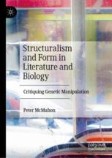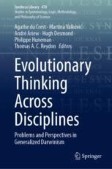Search
Search Results
-
Charles Peirce’s Philosophy and the Intersection Between Biosemiotics and the Philosophy of Biology
Charles S. Peirce’s philosophy of signs, generally construed as the foundation of current semiotic theory, offers a theory of general perception with...
-
Life’s organization between matter and form: Neo-Aristotelian approaches and biosemiotics
In this paper, I discuss the neo-Aristotelian approaches, which usually reinterpret Aristotle’s ideas on form and/or borrow the notion of formal...
-
The Interpreting Organism
Literary formalism attributed meaning to the interactions of devices in the text itself, rejecting extra-textual influences, such as author...
-
Finding or Creating a Living Organism? Past and Future Thought Experiments in Astrobiology Applied to Artificial Intelligence
This is a digest of how various researchers in biology and astrobiology have explored questions of what defines living organisms—definitions based on...
-
A Critique of Barbieri’s Code Biology Through Rosen’s Relational Biology: Reconciling Barbieri’s Biosemiotics with Peircean Biosemiotics
Biosemiotics argues that “sign” and “meaning” are two essential concepts for the explanation of life. Peircean biosemiotics, founded by Tomas Sebeok...

-
Organic Codes: A Unifying Concept for Life
Although the knowledge about biological systems has advanced exponentially in recent decades, it is surprising to realize that the very definition of...

-
Code Biology, Peircean Biosemiotics, and Rosen’s Relational Biology
The classical theories of the genetic code (the stereochemical theory and the coevolution theory ) claimed that its coding rules were determined by...
-
A Biosemiotic Perspective on the Human Condition and the Environmental Crisis
This chapter presents a biosemiotic perspective on the basic situation for human beings and that of other organisms, with an emphasis on the...
-
Introduction: The Genesis of Biosemiotic Literary Criticism: How the Future “Presents” the Past
In this chapter, I provide a theoretical overview of the newly emerging field of biosemiotic criticism (aka “biosemiotic literary criticism”). I...
-
Phenomenology
In this chapter we discuss the phenomenological tradition within philosophy with emphasis on representative phenomenological positions on...
-
Introduction: Knowing What an Organism Is
This book addresses various topics unified under a single overarching theme: agency. It is structured in two sections, one dedicated to philosophy,...
-
Self-Organization Through Semiosis
This article deals with the question of how self-organization in living organisms is realized. Self-organization may be observed in open systems that...
-
Modeling Environments in Literature and Literary Criticism
In this chapter, I focus on applying models from a semiotic point of view for the purposes of understanding how humans represent their environments,...
-
From Cybernetics to Semiotics to Cybersemiotics: The Question of Communication and Meaning Processes in Living Systems
After Thomas Sebeok’s proposal of global semiotics in the 70s, an attempt to move beyond anthroposemiotics to the realm of zoosemiotics,...
-
Epilogue: The Poet as Scientist; The Scientist as Poet
In this chapter, I offer eight biosemiotic concepts or principles and then eight corresponding sets of writing prompts, the idea being to help...
-
Cybersemiotics in the Information Age
Søren Brier’s approach to the study of semiosis in the current Information Age fits in perfectly with the view of Marshall McLuhan that technology...
-
Decentering Humanism in Philosophy and the Sciences: Ecologies of Agency, Subversive Animism, and Diffractional Knowledge
The idea that humans are clearly distinguished from other animals and from the natural world in general is a cornerstone of European philosophy and...
-
The Continuity of Life: On Peirce’s Objective Idealism
Peirce’s metaphysics is a complex system of concepts constitutive of a theory of the world. Among them, there is one of continuity, or Synechism as...
-
Repetition Without Replication: Notes Towards a Theory of Cultural Adaptation
This paper proposes a theoretical framework for the study of cultural adaptation. A subfield within the larger field of cultural evolution, cultural...
-
Distinction-Distinguishing
Living beings are distinctions and the most fundamental activity they engage in is distinguishing. This is what makes them unique and how inquiry...
